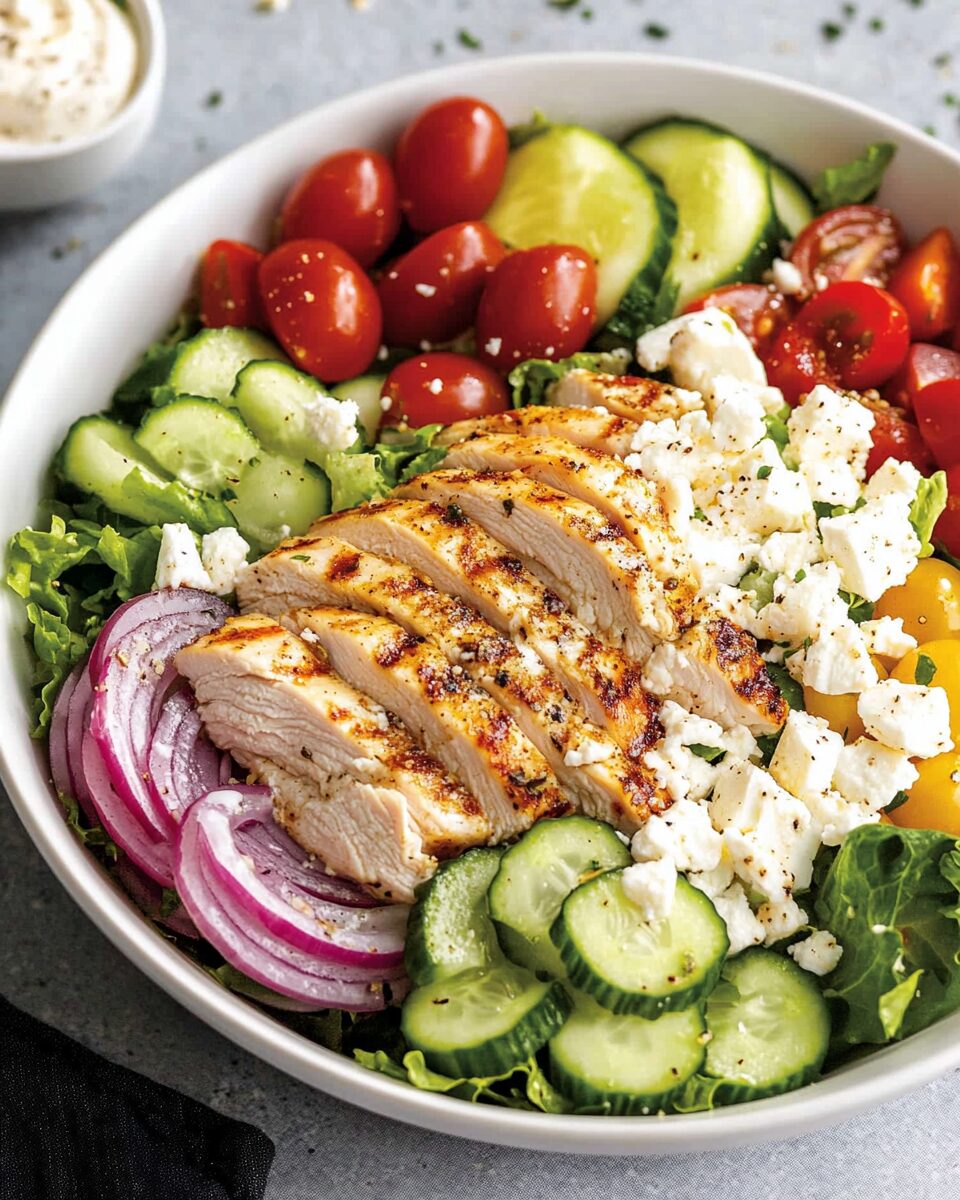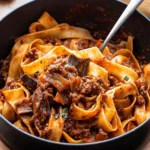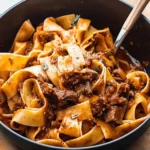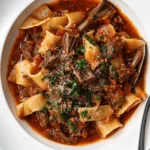This vibrant Greek Chicken Salad Bowl is a wholesome and flavorful dish featuring marinated grilled chicken, crisp vegetables, tangy feta, and a zesty dressing. Perfect for a light yet satisfying lunch or dinner, it brings the classic flavors of a Greek salad into a protein-packed, all-in-one meal.
FULL RECIPE
Ingredients
- 1 lb boneless, skinless chicken breasts
- 2 tbsp olive oil
- 1 tbsp lemon juice
- 1 tsp dried oregano
- 1 garlic clove, minced
- Salt and pepper to taste
- 4 cups chopped romaine lettuce
- 1 cup cherry tomatoes, halved
- 1 cucumber, diced
- 1/4 cup red onion, thinly sliced
- 1/4 cup Kalamata olives, pitted and halved
- 1/3 cup crumbled feta cheese
- 1/2 cup hummus (optional)
- 1/2 cup cooked quinoa (optional)
Directions
- In a bowl, mix olive oil, lemon juice, oregano, garlic, salt, and pepper to create the marinade.
- Add chicken breasts to the marinade and refrigerate for at least 30 minutes.
- Grill or cook chicken over medium heat until fully cooked, about 5-7 minutes per side. Let rest, then slice.
- In serving bowls, arrange romaine lettuce as the base.
- Top with sliced chicken, cherry tomatoes, cucumber, red onion, olives, and feta.
- Add hummus and quinoa if using, for added texture and nutrients.
- Serve immediately or chill for a cold salad bowl.
Nutritional Information
- Calories: 320
- Protein: 30g
- Carbohydrates: 10g
- Fat: 18g
- Fiber: 3g
- Sugar: 4g
Health Benefits of Greek Chicken Salad Bowls
Greek Chicken Salad Bowls combine lean protein from chicken with fresh vegetables and healthy fats from olive oil and olives, making them a nutrient-rich option. The chicken provides essential amino acids for muscle repair and overall body function, while vegetables contribute vital vitamins, minerals, and antioxidants that support immune health. The use of olive oil offers heart-healthy monounsaturated fats known to reduce inflammation and improve cholesterol levels. Feta cheese adds calcium and protein, though it should be consumed in moderation due to its sodium content. Overall, this dish supports balanced nutrition and can be part of a wholesome diet.
Mediterranean Diet Influence
This recipe is inspired by the Mediterranean diet, which emphasizes fresh vegetables, lean proteins, healthy fats, and whole grains. The Mediterranean diet is linked to numerous health benefits, including reduced risks of cardiovascular diseases, improved brain health, and better weight management. Incorporating classic Greek ingredients like olives, feta, lemon, and oregano makes this salad bowl a delicious example of this eating style, combining flavor and nutrition effortlessly.
Versatility and Customization
Greek Chicken Salad Bowls are highly adaptable. You can swap out quinoa for couscous, or add grains like farro or bulgur to increase fiber content. Vegetables can be adjusted seasonally—adding roasted peppers, artichokes, or even beets can enhance texture and taste. For those who prefer a vegetarian version, grilled halloumi or chickpeas can replace chicken, maintaining protein levels while catering to different dietary preferences.
Meal Prep and Convenience
One great advantage of this salad bowl is its suitability for meal prep. The chicken can be marinated and cooked in advance, and vegetables chopped ahead of time. Storing components separately ensures freshness throughout the week. This makes the dish perfect for busy individuals who want quick, healthy meals without sacrificing quality or flavor. The salad bowls can be assembled in minutes, making them ideal for lunch or dinner.
Flavor Profile and Seasoning
The Greek Chicken Salad Bowl balances savory, tangy, and fresh flavors. The lemon and oregano marinade brightens the chicken, while the salty feta and briny olives add depth. Fresh vegetables like cucumber and tomato offer a refreshing crunch. The garlic in the marinade lends a subtle pungency that enhances the overall taste. This mix of Mediterranean flavors creates a dish that is vibrant, well-rounded, and satisfying.
Nutritional Balance
This salad bowl provides a balanced meal with an ideal ratio of macronutrients. Protein from the chicken supports muscle growth and repair, fats from olive oil and cheese offer sustained energy and essential fatty acids, and carbohydrates from vegetables and optional quinoa supply fiber and vitamins. This balance helps maintain stable blood sugar levels and supports sustained energy throughout the day.
Importance of Fresh Ingredients
Using fresh, high-quality ingredients is key to this recipe’s success. Fresh vegetables ensure crisp textures and vibrant flavors, while fresh lemon juice and herbs maximize aroma and taste. Opting for fresh, free-range chicken enhances the flavor and nutritional value. Fresh feta cheese, rather than pre-packaged varieties, has a creamier texture and richer taste, improving the overall experience.
Protein Benefits from Chicken
Chicken breast is a lean protein source that is low in fat but rich in essential amino acids, which are critical for muscle repair and immune function. It also provides B vitamins like niacin and B6, which support energy metabolism. Choosing chicken as the protein base helps keep this salad bowl light but filling, suitable for anyone aiming to build muscle or maintain a healthy weight.
Role of Olives and Olive Oil
Kalamata olives and olive oil contribute heart-healthy fats and antioxidants. Olives are rich in vitamin E and anti-inflammatory compounds, which may reduce the risk of chronic diseases. Olive oil’s monounsaturated fats help improve cholesterol levels and support brain health. Both ingredients are staples of Mediterranean cuisine and enhance the flavor complexity of the dish.
Feta Cheese in Moderation
Feta cheese adds a salty tang and creamy texture, elevating the dish’s taste profile. It is a good source of calcium and protein but tends to be high in sodium and saturated fat. Using feta in moderation helps keep the salad healthy while still enjoying its rich flavor. For those watching their sodium intake, reduced-sodium feta options or smaller amounts can be used without sacrificing taste.
Incorporating Whole Grains
Adding quinoa or other whole grains increases the fiber content of the salad bowl, promoting digestive health and prolonging feelings of fullness. Whole grains also add additional vitamins and minerals, such as magnesium and B vitamins, which are vital for energy production and cellular function. This makes the meal more balanced and nutritionally complete.
Gluten-Free Option
This recipe can easily accommodate gluten-free diets by omitting any grain additions like couscous or wheat-based sides. Quinoa, a naturally gluten-free grain, is an excellent substitute. All other ingredients in the salad bowl are naturally gluten-free, making it accessible for those with gluten sensitivities or celiac disease.
Low-Carb and Keto Adaptations
For those following low-carb or ketogenic diets, the quinoa or grains can be omitted entirely, focusing on the chicken, vegetables, olives, and cheese. Using more olive oil or avocado-based dressings can increase healthy fats. This adaptation keeps the dish flavorful and satisfying while aligning with specific dietary goals.
Sustainability and Ethical Considerations
Choosing sustainably sourced chicken and organic vegetables supports environmental health and ethical farming practices. Free-range or pasture-raised chicken options often have higher welfare standards and better nutrient profiles. Using seasonal, local produce reduces the carbon footprint and ensures fresher, tastier ingredients.
Cultural Significance
Greek salads are a traditional part of Mediterranean cuisine with roots tracing back centuries. Incorporating grilled chicken transforms this classic salad into a more substantial meal while honoring its origins. The use of herbs like oregano and simple dressings celebrates the Mediterranean philosophy of letting fresh, quality ingredients shine.
Family-Friendly Meal
Greek Chicken Salad Bowls appeal to a wide range of palates and are easy to customize, making them a great option for family meals. Kids and adults alike can enjoy the fresh vegetables and tender chicken, and the bowls can be adjusted for picky eaters by separating ingredients or serving dressings on the side.
Weight Management Support
This recipe is naturally portion-controlled and nutrient-dense, which helps support healthy weight management. The high protein content increases satiety, reducing the likelihood of overeating. Fiber from vegetables and grains aids digestion and keeps energy steady. The healthy fats contribute to fullness and support metabolic health.
Hydration and Refreshing Qualities
The fresh vegetables, especially cucumber and tomatoes, contain high water content that aids hydration and provides a crisp, refreshing bite. This makes the salad bowl not only nourishing but also hydrating, especially appealing during warmer months or after exercise.
Potential for Spices and Variations
While the classic oregano and lemon flavor is traditional, this recipe lends itself well to experimenting with other herbs and spices. Adding fresh mint, dill, or parsley can offer new flavor dimensions. A sprinkle of smoked paprika or sumac can introduce a smoky or tart note, keeping the dish exciting and customizable.
Serving Suggestions and Pairings
Greek Chicken Salad Bowls can be served alone for a light meal or paired with warm pita bread, tzatziki sauce, or roasted vegetables for a heartier feast. A chilled glass of white wine or a refreshing iced tea complements the bright, fresh flavors beautifully. This versatility makes it suitable for casual lunches or elegant dinners.
Conclusion
Greek Chicken Salad Bowls offer a perfect blend of nutrition, flavor, and convenience. Rooted in Mediterranean tradition, this dish delivers a satisfying balance of lean protein, fresh vegetables, healthy fats, and vibrant seasonings. Its versatility allows for easy customization to suit various dietary preferences and lifestyles. Whether prepared for a quick weekday lunch, a meal prep option, or a casual family dinner, this salad bowl is a delicious and wholesome choice that supports overall health and wellbeing.






